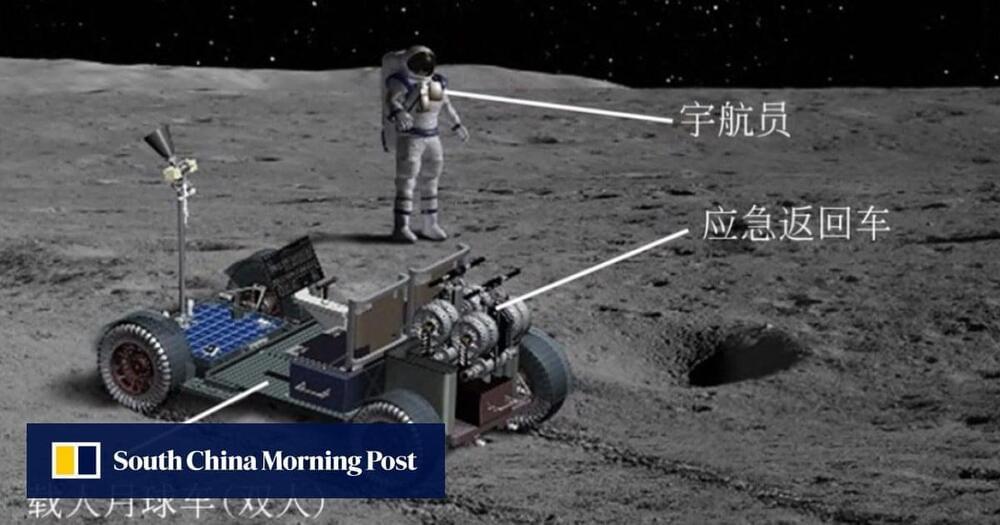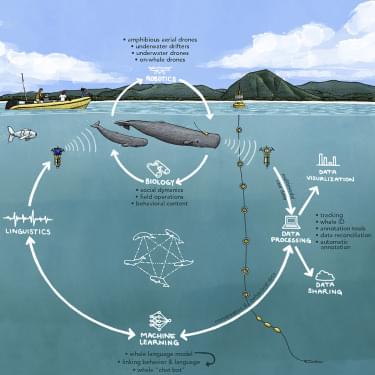Never listen to anyone who says the big questions have already been answered. We still have plenty to learn about extending our lifespans.





Tesla is about to launch a big new software update that includes a few new features and a lot of user interface upgrades.
As a Tesla owner, it’s always a good day to get a notification that a new software update is available. You start wondering what new features or improvements you are getting that day.
Well, now we have a good preview of the next Tesla software update as Teslascope (a service that tracks Tesla software updates) found out about a new update that the automaker is pushing to employee vehicles, which generally means it will be coming soon to the customer fleet as well.

Homologous pairing (HP), i.e., the pairing of similar or identical double-stranded DNA, is an insufficiently understood fundamental biological process. HP is now understood to also occur without protein mediation, but crucial mechanistic details remain poorly established. Unfortunately, systematic studies of sequence dependence are not practical due to the enormous number of nucleotide permutations and multiple possible conformations involved in existing biophysical strategies even when using as few as 150 basepairs. Here, we show that HP can occur in DNA as short as 18 basepairs in a colloidal microparticle-based system. Exemplary systematic studies include resolving opposing reports of the impact of % AT composition, validating the impact of nucleotide order and triplet framework and revealing isotropic bendability to be crucial for HP. These studies are enabled by statistical analysis of crystal size and fraction within coexisting fluid-crystal phases of double-stranded DNA-grafted colloidal microspheres, where crystallization is predicated by HP.


Many experts in the industry predict the cost of quantum computing hardware will continue to decrease over time as the technology advances, making it more accessible to a broader range of businesses and organizations. In a recent talk, the CTO of the CIA Nand Mulchandani noted that the quantum industry is still very early and unit costs are still very high, as we are very much in the research and development stage.
In general, pricing concerns are sure to be influenced by several important factors, including how advanced discoveries in the sector are made, market demand for the technology and competition among quantum computing providers.
The Quantum Insider observes with a keen eye the market trends and technological narrative that is evolving as we speak. When thinking about the price of a quantum computer price in 2023, it’s worth considering the access method, the type of computer and usage requirements.
Can we connect human brains together? What are the limits of what we can do with our brain? Is BrainNet our future?
In science fiction movies, scientists’ brains are downloaded into computers and criminal brains are connected to the Internet. Interesting, but how does it work in real life?
Original title: The greedy brain.
Scientific journalist Rob van Hattum wondered what information we can truly get from our brain and came across an extraordinary scientific experience.
An experiment where the brains of two rats were directly connected: one rat was in the United States and the other rat was in Brazil. They could influence the brain of the other directly. Miguel Nicolelis is the Brazilian neurologist who conducted this experiment. In his book ‘Beyond Boundaries’ he describes his special experiences in detail and predicts that it should be possible to create a kind of BrainNet.
For Backlight, Rob van Hattum went to Sao Paulo and also visited all Dutch neuroscientists, looking for what the future holds for our brain. He connected his own brain to computers and let it completely be scanned, searching for the limits of reading out the brain.
Originally broadcasted by VPRO in 2014.
© VPRO Backlight July 2014
On VPRO broadcast you will find nonfiction videos with English subtitles, French subtitles and Spanish subtitles, such as documentaries, short interviews and documentary series.
VPRO Documentary publishes one new subtitled documentary about current affairs, finance, sustainability, climate change or politics every week. We research subjects like politics, world economy, society and science with experts and try to grasp the essence of prominent trends and developments.
Visit additional youtube channels bij VPRO broadcast:
VPRO Broadcast, all international VPRO programs: https://www.youtube.com/VPRObroadcast.
VPRO DOK, German only documentaries: https://www.youtube.com/channel/UCBi0VEPANmiT5zOoGvCi8Sg.
VPRO Metropolis, remarkable stories from all over the world: https://www.youtube.com/user/VPROmetropolis.
VPRO World Stories, the travel series of VPRO: https://www.youtube.com/VPROworldstories.
VPRO Extra, additional footage and one off’s: https://www.youtube.com/channel/UCTLrhK07g6LP-JtT0VVE56A
www.VPRObroadcast.com.
Credits:
Director: Rob van Hattum.
English, French and Spanish subtitles: Ericsson.
French and Spanish subtitles are co-funded by European Union.

The recent success of machine learning (ML) methods in answering similar questions in human languages (Natural Language Processing or NLP) is related to the availability of large-scale datasets. The effort of creating a biological dataset in a format, level of detail, scale, and time span amenable to ML-based analysis is capital intensive and necessitates a multidisciplinary expertise to develop, deploy, and maintain specialized hardware to collect acoustic and behavioral signals, as well as software to process and analyze them, develop linguistic models that reveal the structure of animal communication and ground it in behavior, and finally perform playback experiments to attempt bidirectional communication for validation ( Figure 1 ). Yet, the deployment of graphics processing unit’s (GPU) is following a trajectory akin to Moore’s Law ( https://openai.com/blog/ai-and-compute) and, at the same time, the success of such an endeavor could potentially yield cross-applications and advancements in broader communities investigating non-human communication and animal behavioral research. One of the main drivers of progress making deep learning successful has been the availability of large (both labeled and unlabeled) datasets (and of architectures capable of taking advantage of such large data). To build a more complete picture and capture the full range of a species’ behavior, collecting datasets containing measurements across a broad set of factors is essential. In turn, setting up infrastructure that allows for the collection of broad and sizable datasets would facilitate studies that allow the autonomous discovery of the meaning-carrying units of communication.
A dedicated interdisciplinary initiative toward a detailed understanding of animal communication could arguably be made with a number of species as its focus. Birds, primates, and marine mammals have all given insight into the capacity of animal communication. In some ways, the collective understanding of the capacity for and faculty of communication in non-humans has been built through experimentation and observation across a wide number of taxa ( Fitch, 2005 ; Hauser et al., 2002). The findings on both the underlying neurobiological systems underpinning communicative capacity, and the complexity and diversity of the communication system itself often mirror our ability with which to work with a given species, or the existence of prominent long-term field research programs.
Animal communication researchers have conducted extensive studies of various species, including spiders (e.g. Elias et al., 2012 ; Hebets et al., 2013), pollinators (e.g Kulahci et al., 2008), rodents (e.g Ackers and Slobodchikoff, 1999 ; Slobodchikoff et al., 2009), birds (e.g Baker, 2001 ; Griesser et al., 2018), primates (e.g. Clarke et al., 2006 ; Jones and Van Cantfort, 2007 ; Leavens, 2007 ; Ouattara et al., 2009 ; Schlenker et al., 2016 ; Seyfarth et al., 1980), and cetaceans (e.g Janik, 2014 ; Janik and Sayigh, 2013), showing that animal communication involves diverse strategies, functions, and hierarchical components, and encompasses multiple modalities. Previous research efforts often focused on the mechanistic, computational, and structural aspects of animal communication systems. In human care, there have been several successful attempts of establishing a dialogue with birds (e.g.
Eliezer Yudkowsky is a researcher, writer, and philosopher on the topic of superintelligent AI. Please support this podcast by checking out our sponsors:
- Linode: https://linode.com/lex to get $100 free credit.
- House of Macadamias: https://houseofmacadamias.com/lex and use code LEX to get 20% off your first order.
- InsideTracker: https://insidetracker.com/lex to get 20% off.
EPISODE LINKS:
Eliezer’s Twitter: https://twitter.com/ESYudkowsky.
LessWrong Blog: https://lesswrong.com.
Eliezer’s Blog page: https://www.lesswrong.com/users/eliezer_yudkowsky.
Books and resources mentioned:
1. AGI Ruin (blog post): https://lesswrong.com/posts/uMQ3cqWDPHhjtiesc/agi-ruin-a-list-of-lethalities.
2. Adaptation and Natural Selection: https://amzn.to/40F5gfa.
PODCAST INFO:
Podcast website: https://lexfridman.com/podcast.
Apple Podcasts: https://apple.co/2lwqZIr.
Spotify: https://spoti.fi/2nEwCF8
RSS: https://lexfridman.com/feed/podcast/
Full episodes playlist: https://www.youtube.com/playlist?list=PLrAXtmErZgOdP_8GztsuKi9nrraNbKKp4
Clips playlist: https://www.youtube.com/playlist?list=PLrAXtmErZgOeciFP3CBCIEElOJeitOr41
OUTLINE:
0:00 — Introduction.
0:43 — GPT-4
23:23 — Open sourcing GPT-4
39:41 — Defining AGI
47:38 — AGI alignment.
1:30:30 — How AGI may kill us.
2:22:51 — Superintelligence.
2:30:03 — Evolution.
2:36:33 — Consciousness.
2:47:04 — Aliens.
2:52:35 — AGI Timeline.
3:00:35 — Ego.
3:06:27 — Advice for young people.
3:11:45 — Mortality.
3:13:26 — Love.
SOCIAL:
- Twitter: https://twitter.com/lexfridman.
- LinkedIn: https://www.linkedin.com/in/lexfridman.
- Facebook: https://www.facebook.com/lexfridman.
- Instagram: https://www.instagram.com/lexfridman.
- Medium: https://medium.com/@lexfridman.
- Reddit: https://reddit.com/r/lexfridman.
- Support on Patreon: https://www.patreon.com/lexfridman